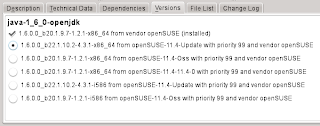Twice did I nearly punch my keyboard in frustration recently: First Skype was bought up by Microsoft then Facebook deleted all photos uploaded from KDE Linux.
Evil, dumb or both?
Granted, Skype merely went from proprietary and closed to proprietary, closed
and owned by the evil ones. I did consider looking for an open source, cross platform alternative
and so did others.
The Skype protocol was reverse engineered and there was some downtime issues shortly after. But I haven't cared enough about the issue yet.
And granted, the deleting of photos uploaded with a common KDE plugin used by some photography software (including my beloved Digikam) was temporary.
Others were quick to complain. Imagine the uproar if it had been all photos uploaded by iPhoto that had been removed. But apparently, Facebook has people working for them that think stuff coming from this Linux-something is too suspicious and will actually hit the red button.
Add to the above that Facebook - with its history of privacy issues - are working with Skype to integrate their networks. We should all be panicking for alternatives and reverse engineered protocols. But then again...
Google: Not evil, not dumb
Google+ has something called Hangouts which is actually group video chatting. They are not open source but they have a history of being not evil and they are fully cross platform in being a cloud service. Their Picasa, neatly integrated in G+, beats Facebook's photo albums by any measure. So, Google+ is if not a full solution, then at least could be a great relief. And some badly needed competition.
Add to that
this interview with Googles Open Source Boss, Chris di Bona: Besides creating Android, a major Linux success story, Chris tells:
"We have released something like 1,300 open source projects to the outside world in the last five years. That amounts to 24-25 million lines of code, using a variety of licenses. So basically whatever device or computer you use it most likely has some code from us in there, be it through our compiler or our application work. [Among the projects Google contribute to are] GCC. But also the Linux kernel and all the compiler tools, languages like Java, C++ and Python. Also we found that things like OpenSSL is super-important to us, also FFmpeg [...] We have Linux, a very very small amount of Windows, and a fair number of OS X machines. If you'd look at laptops it's maybe 70 percent Mac OS X and most of the rest is Linux, we are a huge customer of Apple. Engineering Desktops are overwhelmingly running on Linux. We have our own Ubuntu derivative called "Goobuntu" internally for that, integrating with our network"
 |
| Shouldn't the caption go "I can't wait for Google+ to let me spam everyone that blocked me on Facebook"? Which the creep will have no success with due to the Circles concept at G+ :-) |
Now, if G+ will be "successful" or not? I predict a crowd of communication people and social media experts (people in need of getting head butted) giving Google+ bad reviews. Simply because Facebook was finally a service they could figure out using. Don't trust these pro spammers. Many people will join G+ because if you already use one or more Google services there really is little reason not to.
I already got the protest a couple of times that, since everyone's already on Facebook why should anyone create a G+ profile? Besides the arguments above, I'll throw out an example of how it adds to the services: I have
a public album of my own wallpapers on Picasa (Google+ Pictures). These will not fit on Facebook in any way, because there pictures can be no larger than 600-and-something pixels on either side (can't even be full size of most wide screen monitors are at Flickr). And they don't need to be on Facebook because there are no people to tag in them - even if they had I still can tag in Picasa. That doesn't mean I'll head over and delete all my photos on Facebook though.




